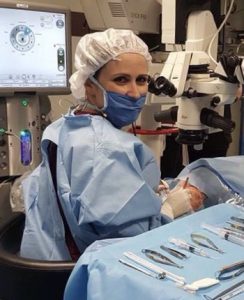Face to face with an opinion leader in the eye-care sector in Mexico. Hasta la vista!
Can you tell us about your professional background? How long have you been working in the ophthalmic field and why did you choose this speciality?
I completed my specialisation in ophthalmology in 1997 and immediately afterwards, from 1997 to 1998, I completed a second subspecialisation in anterior segment of the eye and cataract. Since then I have been totally dedicated to ophthalmology. I started working in Mexico City with colleagues in private practice and then I moved to Monterrey with my family because my husband is originally from Monterrey. He is also an ophthalmologist specialising in cornea and refractive surgery. I currently run the Institute for the Prevention of Blindness (Nuevo León AC) where we provide services for low-income patients; privately, I am the Medical Director of Ambulatory Surgery SC. I chose this speciality because while I was studying medicine I became interested in all aspects of ocular medicine, also because it is a field that no other doctor can get involved in unless they specialise in ophthalmology (they would not be able to diagnose the different ophthalmological pathologies, let alone perform ocular surgery). I love everything about surgery and, above all, being aware that I am giving my patients their sight back.
From your point of view, what is the biggest challenge in the eye-care sector today, in Mexico and worldwide?
The most important challenge is to combat blindness; since cataract is the leading cause of reversible blindness in the world, we must promote support programmes to be able to help cataract patients in a concrete way on the one hand, and implement prevention programmes to reduce the incidence of visual dysfunction on the other. In addition, awareness must be raised of the importance of eye health and the need for regular check-ups, at least once a year. Furthermore, it is crucial to run campaigns to emphasise the importance of cataract surgery. Promoting campaigns to detect glaucoma and diabetic retinopathy is also crucial, as the latter two diseases are the main causes of irreversible blindness.
 What are the myths and misconceptions about cataracts?
What are the myths and misconceptions about cataracts?
Myths and misconceptions: that cataracts are a spot in the eye, that they only affect older people, that they recur even after surgical removal, that cataracts can be 'dissolved' with eye drops, that they can develop if we read or sew a lot, or watch TV for a long time, that cataract surgery involves risks and recovery is slow, that intraocular lenses can be rejected by our bodies, that cataracts can be removed with laser surgery.
What kind of research and products are available in Mexico for cataracts?
Recommended preventive measures to avoid lens ageing are: protecting the eyes from UV light by using sunglasses and increasing the intake of omega-3, lutein, zeaxanthin, etc. In terms of surgical management, there are several new materials and equipment specifically for performing surgery, e.g. different types of machines, viscoelastic materials, intraocular lenses and pre- and post-surgical procedures.
What would you say to a patient considering cataract surgery?
Cataract surgery is performed on an outpatient basis, is a relatively quick surgical procedure to restore vision, to correct visual problems and to provide different intraocular lens options according to each patient's needs. The patient must be reassured about the safety of the surgical technique and the low incidence of infection.
What have been your most satisfying experiences as a cataract specialist?
As an ophthalmologist, I have had many rewarding experiences over the years, particularly in cataract surgery. The most moving ones concern patients with hypermature or brownish cataracts, whose visual acuity improves up to 20/20 after the operation and who return to my practice crying, with strong feelings of gratitude and thankfulness. We also usually try to track paediatric patients (congenital cataract patients) so that they can grow up with visual functions that allow them to fulfil themselves educationally, psychologically and socially. I also think of cases of traumatic cataract surgery that require urgent treatment and then quickly resolve with the recovery or maintenance of sight.
Dr. Carmelo Chines
Direttore responsabile
